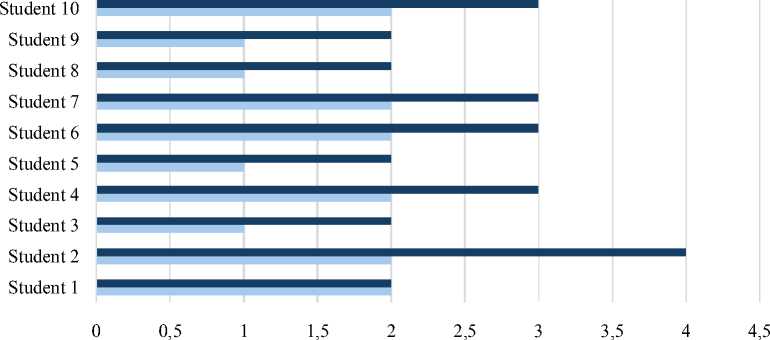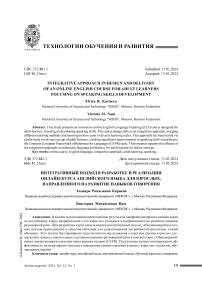Integrative approach in design and delivery of an online English course for adult learners focusing on speaking skills development
Автор: Kartseva E.R., Nam V.M.
Журнал: Artium Magister @artium
Рубрика: Технологии обучения и развития
Статья в выпуске: 2 т.24, 2024 года.
Бесплатный доступ
This study presents an innovative online English Language Teaching (ELT) course designed for adult learners, focusing on developing speaking skills. The course design utilizes an integrative approach, merging different teaching methods and learning tools to cater to diverse learning styles. This approach has been tested via a pilot study involving a group of adult learners, yielding significant improvements in speaking skills according to the Common European Framework of Reference for Languages (CEFR) scale. This research supports the efficacy of the integrative approach in enhancing language proficiency for adult learners in online settings.
Online course, english language, integrative approach, adult learning, speaking
Короткий адрес: https://sciup.org/149146510
IDR: 149146510 | УДК: 372.881.1
Текст научной статьи Integrative approach in design and delivery of an online English course for adult learners focusing on speaking skills development
Nowadays communication has its own place in the center of developing world. Globalization processes allow people to communicate not only in one country but also encourage them to learn about new cultures and people belonging to these cultures. That is why in the twenty-first century world many people are eager to learn English as a global language to broaden their personal and professional horizons. Nevertheless, being able to communicate in English opens new and wider opportunities for education and travelling. Especially English proficiency is in high demand among adults who always tend to gain experience getting a job in international countries, studying abroad or discovering the world through travelling around it. Such tendency highlights the importance of learning English and improving speaking proficiency to develop and perform effectively at present times.
Trends in education are also not losing their position. With the development of digital era under various circumstances, education has started switching to the online environment. Fast-paced lifestyle has raised the demand on online educational products among adult learners because it allows them to study at any time and place without wasting time on commuting to classrooms from their homes or offices. Following these tendencies in modern society educators have a great opportunity to improve online education and provide people from all over the world with the unique products that can help them to enhance their language proficiency [1].
This paper is relevant to the current dynamics of e-learning and the growing demand for digital education. The study focuses on the development of online English language teaching courses for adult learners, in particular, teaching speaking in a digital environment using the integrative approach. The aim of the study is to design and deliver an online course for adults based on asynchronous learning mode and focused on the development of speaking skills using different tools of the integrative approach.
This study addresses the integrative approach in order to improve online adult English language learning, which is specifically focused on speaking skills. Taking up the need for effective online learning, this study addresses the potential of an integrative approach that incorporates a variety of teaching methods and digital technologies.
The study is aimed to find out the credible answer to the questions if the integrative approach facilitates the speaking skills development of adult learners in the design and delivery of an online English course.
Methodology
The research methodology used in this study is a credible, diverse approach that is based on several analytical methods. It is designed to provide a comprehensive understanding of the topic at hand.
First, a literature review that provides an understanding of existing research and theories relevant to the field of study was conducted to identify gaps in current understanding and ensure that our work contributes something new and valuable to the field.
Afterwards, a comparative and qualitative analysis is conducted. This involves looking in detail at the needs of our target audience, the materials we have at our disposal and the outcomes we are achieving.
After identifying course goals and learning objective, an online English course “Speak Easy” was designed on the Progress.me platform. The course consists of 3 modules, covering the topics of everyday life, travelling and 21st century world issues. The course of 21 lessons is asynchronous and takes 36 academic hours to be completed.
An important part of the research methodology is the use of a variety of data collection methods, including entrance and exit surveys, as well as pre-test and post-test surveys. These tools allow us to collect quantitative data directly from the target audience at various stages of the research process. These data are invaluable for tracking change over time, measuring the effectiveness of our interventions, and providing empirical evidence.
Results
After having promoted the course via different media recourses, the final number of people who enrolled to the course was 13. After eight weeks when the course deadline was reached, 10 out of 13 participants completed the course successfully, i.e., all 10 learners have completed 90% of the course lessons and taken
E.R. Kartseva, V.M. Nam. The Role of Integrative Approach in Design and Delivery of an Online English Course part in pre- and post-tests. There are 2 participants who have completed 50% of the course, and only 1 learner who did not manage to reach the middle of the course.
From the Table below, the results of the pretest and post-test comparisons are summarized. With these tests, a comparison of the difference in scores between the pre-test and post-test of students’ speaking proficiency was used. The pretest was administered before students began the course modules. The post-test was conducted after all classes were completed and is considered as a final test to check the proficiency of the students.
According to the results analysis, nine out of ten participants managed to improve their pre-test scores in comparison with post-test bands.
As seen in the table above, 90% of enrolled participants improved their vocabulary and grammar, demonstrating that this course is quite helpful in enhancing their speaking skills. Within two months of the course, the participants were able to further develop their speaking skills and achieve higher scores than they had on the pretest. The students’ increased English-speaking skills were substantiated by their higher post-test scores, which were the result of the implementation of the integrative approach when designing and providing the course [2].
Collecting and analyzing results of the course completion rate was not the final stage of the study. Online course design and implementation also requires investigating satisfaction rate of the participants in order to let the educators evaluate their pedagogical design competence and make improvements for further course implementation. Through a feedback survey, data were collected to determine students’ satisfaction and to explore students’ experiences and ideas about the course. Furthermore, the goal of the survey was administered to identify the usefulness of the selected topics presented for study in the context of a particular integrative approach, as well as the utility of the information and visuals provided. Ten people completed the questionnaire.
According to the survey, half of the participants, or five out of ten, were strongly agreed to recommend the course to their family, friends or colleagues. This offers an intriguing insight into how participants perceive and evaluate the course. Having this perception can play an important role in encouraging future enrollments and shaping the course’s position within the broader educational discourse.
From the results of the course and the feedback, it appears that the overall course design and piloting went positively. In addition to fulfilling its objectives, the course also provided useful insights. These conclusions, based on real experience and direct feedback, were useful in evaluating the effectiveness of the course. It is evident that the integrative approach to creating an online course is not only effective, but also produces positive and enjoyable
Course Results

■ Post-test ■ Pre-test
Pre- and post-tests results results. This result of the study demonstrates the prospective advantages of the approach and offers opportunities to course design in digital educational environment.
Discussion
Following the study aim and looking at the results of the research it can be stated that the integrative approach contributes to the development of adult learners’ speaking skills in the design and delivery of the online English course.
The reason for this lies in the knowledge that online courses based on the integrative approach usually include a lot of activities that promote speaking practice. Additionally, using the integrative approach helps adult learners to significantly strengthen their speaking skills. With this strategy, learners can be encouraged to practice the different components of speaking in context, which enhances their over-all language acquisition and development. Comparing the main results with those published earlier, it is possible to say that they generally confirm the effectiveness of the integrative approach in English language teaching.
However, it is worth noting some limitations of the study. In particular, we did not take into account students’ individual differences, such as their previous English learning experiences or their preferences in learning styles. Besides, considerable constraints in data collection and interpretation may have limited the results of the study. Taking into account the qualitative aspect of the study, subjective evaluations and biases of the course designers or instructors during the course design and delivery process may have contributed to the results of the study. It is therefore vital to use assessment measures validated by global educational organizations in order to obtain objective and valid results.
The main conclusion of our study is that the integrative approach can be effectively used in the design and implementation of online English courses for adults aimed at developing speaking skills.
Список литературы Integrative approach in design and delivery of an online English course for adult learners focusing on speaking skills development
- Kim T.-Y. Crystal David (2003). English as a Global Language. (2nd ed. First ed., 1997), Cambridge: Cambridge University Press. xv + 212 pp., ISBN Hb 0521 82347 1, Pb 0 521 53032 6. Sociolinguistic Studies, 2004, pp. 389-393. DOI: 10.1558/sols.v5i2.389
- Richards J., Rodgers T. Approaches and Methods in Language Teaching: A Description and Analysis. London, Cambridge University Press, 2001. 171 р.


